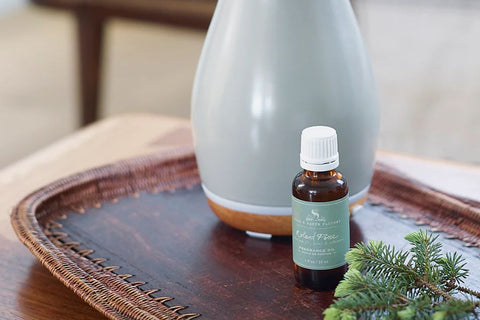About Essential Oils: A Beginner's Guide to Aromatherapy

Essential oils have gained popularity as natural remedies for a variety of ailments and as tools for promoting overall well-being. Derived from aromatic plants, these potent oils are renowned for their therapeutic properties and are commonly used in aromatherapy—a holistic healing practice that harnesses the power of scent to promote physical, emotional, and mental health. In this beginner's guide to aromatherapy, we'll talk about essential oils, their benefits, and how to incorporate them into your daily routine.
Understanding Essential Oils
Essential oils are concentrated extracts derived from various parts of aromatic plants, including flowers, leaves, bark, stems, and roots. These oils contain the natural aromatic compounds that give plants their distinctive fragrances and therapeutic properties. Essential oils are extracted through methods such as steam distillation, cold pressing, or solvent extraction, resulting in highly concentrated and potent oils that retain the plant's beneficial properties.
Benefits of Aromatherapy
Aromatherapy is the practice of using essential oils to improve physical, emotional, and mental well-being. When inhaled or applied to the skin, essential oils can stimulate the limbic system—the part of the brain responsible for emotions, memory, and mood regulation—triggering various physiological responses. Some common benefits of aromatherapy include:
Stress Reduction: Certain essential oils, such as lavender, chamomile, and bergamot, are known for their calming and soothing effects, helping to reduce stress, anxiety, and promote relaxation.
Improved Sleep: Essential oils such as lavender, cedarwood, and sandalwood have sedative properties that can help promote restful sleep and alleviate insomnia.
About Essential Oils: Citrus oils like lemon, orange, and grapefruit are uplifting and energizing, promoting feelings of happiness, positivity, and mental clarity.
Pain Relief: Peppermint, eucalyptus, and ginger essential oils have analgesic and anti-inflammatory properties that can help alleviate headaches, muscle tension, and other types of pain.
Respiratory Support: Eucalyptus, tea tree, and peppermint essential oils have decongestant and expectorant properties that can help relieve respiratory issues such as congestion, coughs, and sinusitis.
How to Use Essential Oils
There are several ways to use essential oils in aromatherapy, including:
Inhalation: Add a few drops of essential oil to a diffuser or inhale directly from the bottle to enjoy the aromatic benefits of the oil.
Topical Application: Dilute essential oils with a carrier oil such as jojoba, coconut, or almond oil, and apply to the skin for massage, topical application, or added to bathwater for a relaxing soak.
Steam Inhalation: Add a few drops of essential oil to a bowl of hot water, cover your head with a towel, and inhale the steam to clear congestion and soothe respiratory issues.
Aromatic Bath: Add a few drops of essential oil to a warm bath to create a luxurious and relaxing bathing experience.
Room Spray: Mix essential oils with water in a spray bottle and use as a natural air freshener to refresh and purify the air in your home or office.
Safety Precautions
While essential oils are generally safe when used as directed, it's essential to exercise caution and follow safety guidelines to avoid adverse reactions. Some important safety precautions to keep in mind include:
Dilution: Always dilute essential oils with a carrier oil before applying to the skin to prevent irritation or sensitivity reactions.
Patch Test: Perform a patch test on a small area of skin before using a new essential oil to check for any allergic reactions or skin sensitivities.
Avoiding Sun Exposure: Some essential oils, such as citrus oils, can increase the skin's sensitivity to sunlight. Avoid sun exposure or use sunscreen after applying citrus oils topically.
Keep Out of Reach of Children and Pets: Essential oils are highly concentrated and should be kept out of reach of children and pets to prevent accidental ingestion or misuse.
Essential oils are powerful tools for promoting physical, emotional, and mental well-being through the practice of aromatherapy. By knowing about essential oils, their benefits, and how to use them safely, beginners can harness the therapeutic power of scent to enhance their overall quality of life. Whether you're looking to reduce stress, improve sleep, or enhance mood, essential oils offer a natural and effective solution for achieving optimal health and wellness.

